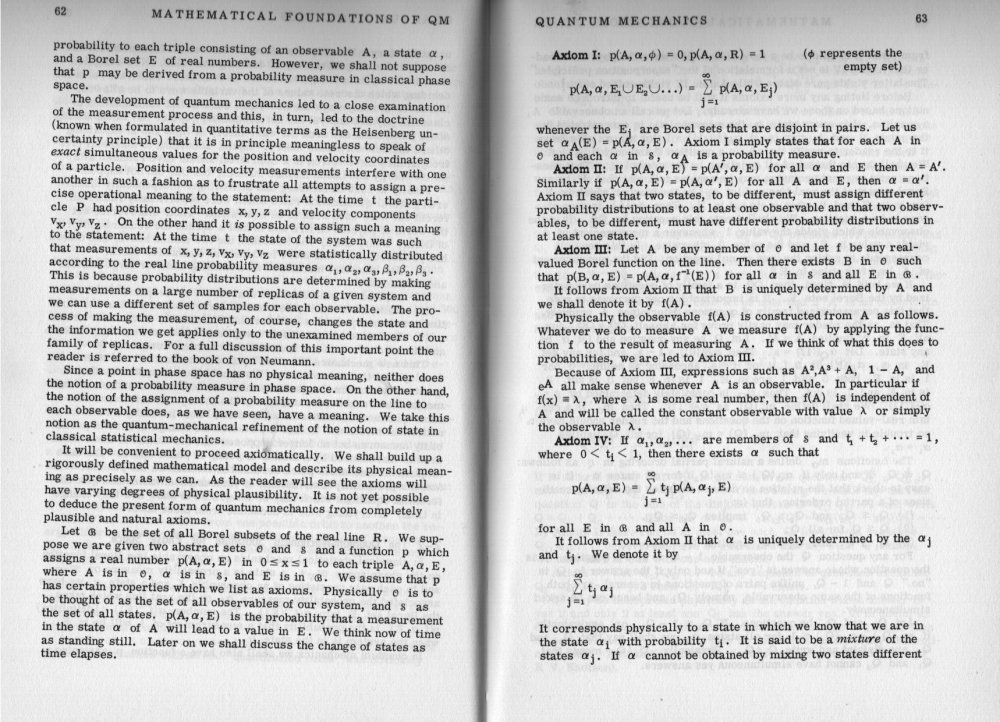Leaderboard
Popular Content
Showing content with the highest reputation on 12/16/20 in all areas
-
Yes, spot on. There is a huge social pressure to be “normal”, i.e. conform to what is current consensus and convention. Even academically in school, you are often expected to solve problems in certain very specific ways, and if you don’t, you risk being marked down for it, even if the final answer is correct. That has happened to me on countless occasions, as I do remember. In Japan they have a saying: “The nail that stands out gets hammered down” That’s most likely because the environment was not conducive. And asserting our own strengths in a neurotypical environment is notoriously hard for us. If you were being told all your life that there is something not right with you because you don’t do things and see things the same way as everyone else, you would be seeing yourself in a negative light too. Perhaps they were on the spectrum, but didn’t know it themselves. For me personally, I was diagnosed late in life (only a few years ago), and before that I didn’t have a clue about being autistic. I always knew I was different, and the rest of the world wasn’t shy in letting me know that I didn’t fit in, but I didn’t know why. I felt like a failure and an outcast everywhere I went. Being able to actually put a label to it and say “Yes, I am autistic, I am neurodivergent” was a huge turning point - it was only then that I began to see my own strengths too, and not just my social failings. There’s a huge and fundamental difference between being a “normal people” (neurotypical) failure, and being a normal neurodivergent. Does that make sense? This is all a matter of perspective and context. Someone once said that, if you judge a fish by its ability to climb trees, it will never amount to anything; but see it in its natural element, and it reigns supreme. Of course “normal” people will tend to see neurodivergents as being disabled, because they are different and not good at being normal. But by the same token I might judge neurotypicals as “disabled”, because they can’t do certain things that come natural to me. So it’s all relative and contextual. In my experience there are many people out there who have autistic traits, but don’t know themselves that they might be on the spectrum; things usually go badly for such people, because when you are neurodivergent yet try to follow neurotypical life templates, you will inevitably suffer. People like that nearly always feel they are failures in life, because they just don’t fit in anywhere, and can’t do things that seem to come natural to everyone else. Even their own strengths, interests and abilities may be perceived negatively by them, because those are often not considered “normal” by everyone else. I saw this in myself - what do you think happens when, as a teenager, you don’t want to go to house parties with everyone else in your year, and instead choose to sit at home teaching yourself differential equations from a university textbook, because you want to understand Einstein’s General Relativity better? Your peers won’t be shy at letting you know you’re a weirdo. Quite often though things change when people find out the reason for their being different - I am hearing it time and again from other autistic people that finding out that they are on the spectrum was a life changer, because your brain being wired differently is quite something else compared to being a weirdo and a social failure. For me this was the point when I simply stopped trying to be like everyone else, following the conventional template, and began to live a life that is actually conducive to my strengths and interests. But without the knowledge that I am on the spectrum, I’d still be busy failing miserably at being neurotypical. And yes, it is very common for people to only be diagnosed later in life.3 points
-
How this neurodivergence is experienced is, I think, a very individual thing. All the other people on the spectrum I know (I’m active in various support groups for neurodivergents) have sensory issues to some degree, but only a few of them would call those challenges ‘debilitating’. It depends very much on your personal circumstances, too - if you are (e.g.) very sensitive to noise, then being a parent of very active and noisy kids will put you in an extremely difficult position, just to name a (sadly) very common example. But the reverse is also true, which is something a lot of people forget - many neurotypicals find the absence of sensory stimuli very challenging, which is why so many people cannot bear to be in silence and solitude for very long; most autistics on the other hand have no problem with silence and solitude (within reason of course), and the meaning they attribute to their lives tends to be intrinsic, as opposed to extrinsic (i.e. in terms of social relations to other people). Perhaps I am overgeneralising now, but that’s how it is for me personally, and it is what I observe in other autistics too. Yes, but do remember that there is more to being on the autism spectrum than just differences in sensory processing. The way our thought processes are structured also appears to be different from that of neurotypical people - which is why autistics often come up with unusual and creative solutions to problems posed to them. This does not correspond at all to my own experience as being on the spectrum. I have never had the urge to perform any restricted and repetitive behaviours, and only a relatively small number of people on the spectrum whom I know (and as mentioned above, I am heavily involved in the community, and know a lot of autistics) do. So in terms of actual felt experience, this is most certainly not a core characteristic of everyone on the spectrum. Of course, this being a spectrum, there will be individuals who experience this (I do know a couple of them), but I think it is relatively rare. So if this is actually part of the official diagnostic criteria (which I doubt btw, because I don’t have it at all, and am still diagnosed, as are many others), then the medical community got this badly wrong. Problems with social communication on the other hand is definitely a core part, and I couldn’t even name a single person on the spectrum who doesn’t experience this at least to some degree, myself included. However, it is not due to a lack of cognitive empathy! That’s an urban myth, and a pretty bad one at that. If anything, us neurodivergents we feel empathy (and emotions in general) much more strongly and deeply than people who aren’t on the spectrum. Our problem is, rather, that we cannot “read” other people who are in front of us - when I am interacting with another person, they are like a blank canvas to me, I cannot tell what their emotional state is, or what their intentions towards me are, until a point is reached when it becomes so obvious that even I “get it”. Presumably this is because I cannot read all these little verbal and nonverbal social cues that neurotypicals pick up on straight away without even having to think about it. This is sometimes called “mind-blindness”, though I’m not sure how adequate this term really is. Because I do not know the mental state of the person I am addressing, my reaction to them and how I behave towards them often comes across as uncaring, inappropriate, unconventional, rude, or just whacky - even though there was no intention for any of these on my part, I just can’t meet their immediate social and emotional needs, because I can’t see them and thus don’t know what they are! However, if I do know their mental state (e.g. if someone tells me their close relative has just passed) then I feel as much empathy and compassion as anyone, and will express it as such. So we are perfectly capable of being empathic, we just need help recognising what a social situation is really about; don’t expect us to figure it out from nonverbal cues, because we can’t. I think nothing could be further from the truth, at least in my own felt experience of actually being autistic. Generally speaking, I can quite easily grasp highly abstract and complex relationships, make connections that most neurotypicals would struggle ever grasping, and find approaches to solve problems that (so I’m being told again and again) are highly unusual and creative - both in the academic realm as well as in daily life. Also, we see conventions as just being conventions, so we aren’t stuck in social templates like neurotypicals are. If that is not flexibility of the brain, then I don’t know what is. If we are ever to come face to face with an alien intelligence, I hope the person representing humanity will be autistic, because they will have the ability to relate to this completely unprecedented situation without being attached to restrictive human social conventions, which could be a recipe for disaster here! After all, for us people on the spectrum, every time we meet another person it is much like facing an alien being, for all we can tell about their mental state. So we are well practiced! I must also question why, when autism is spoken about by neurotypical people, it nearly always seems to be defined in terms of something lacking, of something being wrong, of their being a problem, of it being some kind of condition or deficiency. I think this totally misses the point, and many other autistic people find it offensive, because it stereotypes as us “disabled” and somehow not fully functional or normal. But one needs to remember that “normal” is just a social convention, it isn’t an objective criterium, and essentially meaningless. Yes, as autistics we face challenges that neurotypicals don’t, but we also have abilities that many neurotypicals lack. As such, it is better to think of autism as neurodivergence - we aren’t disabled, we are just differently abled. And that’s exactly how we think of ourselves - not as people with a disability (i.e. lacking something we should have by someone else’s subjective standards), but as neurodivergent people who have abilities that differ from the norm. The true difference between these is a sense of self-esteem and self-worth, so it matters to us.3 points
-
Note that my comment regarding data was in the context of the paper you have in the opening post. I did a very quick check of the papers provided by @The Mule and I note that they use other approaches which may have impact on data requirements during training. I'll try to get some time to have a better look at the papers. Do you by the way have some argument why one hundred thousand would be enough? Good! I note that they provide a curated dataset with several types of vulnerabilities. That gives Zak100 some alternatives to the data referenced in the paper in OP. Try the button labeled <> in the menu above the post you are creating: Example: <example>XML Code</example> And welcome and thanks for contributing to the discussion @The Mule.2 points
-
I’m on the autism spectrum myself. The problem here is that we can’t isolate a specific sensory stimulus at the exclusion of everything else. So in this particular example, the stimuli coming from eye contact and his spoken words are both present, and both equally prominent simultaneously, which makes it difficult to focus on the actual content of either one of them. Averting eye contact simply makes it easier to focus on the person’s speech, so a lot of autistics will do this unconsciously and automatically. A better example would be a room full of people all talking to each other; it is very hard for me to just focus on what the person in front of me is saying, since I am forced to equally register all the other conversations in the room at the same time. There is no functioning filter there to limit and focus sensory stimuli - which is why we get sensory overload in certain stimuli-rich environments. Note that this is a matter of degree - different environments affect different autistic people in different ways and degrees.2 points
-
I read a little bit of this article and have no opinion just yet on its validity; however, many years ago, I recall an online Q & A session with an autistic fellow who was particularly eloquent when allowed to type his responses. I recall someone asking why eye contact is so generally difficult among autistic individuals. He said, as I recall his reply, that he could not look at a person and listen to that person at the same time. What I understood from his reply was that he could not process visual and auditory stimuli concurrently without a type of sensory overload. If one is positing autism brain theories, those theories should provide a cogent sensory-to-response basis in brain function or structure for atypical behaviors such as a inability to concurrently process divergent stimuli.2 points
-
Your approval means the world to me The future is already here. It’s just not evenly distributed. Your concerns appear to be more with policy and politics... or, more specifically, other humans with human failings... not with science.1 point
-
I've got to say the chessboard you built really struck a chord with me. I have a chessboard my dad made for me and it is one of my most prized possessions. Like you he chose not to try to carve the pieces. He picked up a set in Mexico on a vacation one year.1 point
-
Science is about discovery. A substantial proportion of scientists are it because they are intrigued by discovery. So science certainly leads to a gain of knowledge. I hope you are not offended by the notion that scientists also welcome a salary for the work they do. Invention lies much more in the field of engineering where profit and gain are what powers further engineering developments. Not in any significant way. No idea what you mean? Of course the application of some scientific discoveries have had negative consequences. That is more in the hands of politiicians, businessmen and the general public than it is in the hands of scientists. And the vast majority of discoveries have been beneficial, or at worst neutral. And yet, while I maintained contact with my parents during the occassional letter when I was on the other side of the planet I can use the internet to video visit with my children and granchildren every week. Science has identified global warming and offered solutions. Famine would be infinitely worse without scientific developments in agriculture. Climate change, as for global warming, which is just a synonym. Application of science can often best be achieved via business model. Do you think that is a problem. Finally you ask a good question. Answer: pretty much.1 point
-
Just to note that suicide rate among autistics is several times higher than in the general population and among autistics WITH A COLLEGE DEGREE unemployment rate is over 80% (for comparison, Down Syndrome only has unemployment rate of approx 40%) It can be a fun experience if you are a VERY high functioning autistic with a lot of social support or if you have a well paid job in STEM field that aligns well with your special interests... I think it is the case for a minority of people on the spectrum.1 point
-
Physical danger, like walking across a busy road without due consideration to traffic, or using knives. The two I know will sit for hours doing the same thing. What we call "commonsense" is lost on them. Bear in mind, as I'm sure you know, they are all different in the challenges they face. Being bullied in school is another because they can send out the wrong social cues and don't respond in the way their non-autistic peers expect. The two I know, one is in his twenties and the other about ten, don't have a realistic prospect of being fully independent, I don't think.1 point
-
Note: While writing this, and putting my thoughts on paper, I changed my mind, I am keeping my reasoning because the questions I want to ask still follow from them. Well I do personally hope that we may have a bunch of people there at that point 😛, because what if these aliens try really hard to use microexpressions or are mimicking the general human expressions in order to convey meaning. Anyway that is kind of off topic and more a joke than anything else. Thank you Markus for sharing this, whenever you explain things about how your brain and that of other people on the autistic spectrum works, I feel I get a lot of insight, and your posts are always very well structured! I really like this type of thinking, but I do catch myself not always thinking in this way, although I know I should rationally (this is what I changed my mind on after finishing writing). I have known two people (in high-school) whose thinking and way of doing things was so different from that of others that it seemed to hurt and hamper them a lot. It feels to me that at least the current environment and culture (especially during school years) makes life (seem) miserable for these people. Of course these feelings are not exclusive to any group of people, but it is hard to not think of their neurodivergent thinking as at least a partial cause of these problems. You mention that there are also strong points, which I don't doubt, but I suppose I haven't been around those two long enough to see the strong points come to light: I didn't know them that well, so I might just be only seeing what I saw in school, but from the few talks I did have about how they experienced these things, I didn't get the feeling that they felt their way of thinking was beneficial, it seemed they at the time viewed it as something net negative (Two people do not represent the whole of the spectrum, but because of these cases I find it difficult to not see it is a disability, at least in those people that themselves view it that way (again, we are talking 15-17 year old kids here.)) @Markus Hanke, in your opinion/experience, is this common, and if it is, people later in their lives come to see their neurodivergence as a benefit? I suppose now that I am thinking about these things and analysing my thoughts, it could also be that the kids were bullied and the reason 'given' was their autism, and that this made them feel that 'without autism these people wouldn't bully me" or "if I wasn't autistic, I could be friends with them". I am still interested in what you think, but I see now that these two examples can't or shouldn't be the only thing that I think of, especially with the fact that we were teenagers at the time. -Dagl1 point
-
In the video that I gave there were used two cameras, one normal, second one with a fisheye lens. You took screenshots of the second. GoPro has a fisheye lens, so it is widely used in such experiments, to have 180 degrees viewing angle. Two cameras on either side of the box give 360. You can later post-process output from single 180, or both cameras, to get something which you can watch using VR helmet. https://www.google.com/search?q=360+degrees+post+processing https://www.google.com/search?q=360+degrees+post+processing+for+vr+helmet1 point
-
Maybe, maybe not, but you do seem to be ignoring the lived experience of those who experience that racism every. single. day of their lives and who have for decades put up with it, even the unintentional stuff.1 point
-
I’ve come to appreciate these when I need something fast and strong. That’s brilliant! No doubt. Very cool! As I’m sure you already know, with 2 year olds the hard part is attention span... Squirrel!! My daughter struggled to focus on those sorts of toys until she was closer to 4 or 5. It wasn’t until then that she could make up stories better in her own mind (kindergarten also really helped broaden her parameters for what’s possible). A few bits of furniture in there will go a very long way. Thanks for sharing!1 point
-
Haha, thanks! I appreciate the kind words. 😀 The floors are 3/4" birch plywood framed by 2x2 select pine. I put it together with glue and used a pocket hole jig which was the first time for me. Not as nice as other joinery but I wanted to try it out and see what all the fuss was about. Pocket holes worked well. The pink roof (I looked for the most outrageous pink I could find!) is made from 1/4" poplar. I just laid out the pattern by using a lid from a jar on my workbench, cut it with a saber saw, and painted it. I hope they like it. At two years old you never know, but if not now I'm sure they grow to like it later. And it is rock solid; four kids could climb on that and it would hold up fine.1 point
-
Hi my friend, Thanks. Very good reply. Repository is what I am looking for. But I think we must have more SC(smart contracts). As @Ghideon has point out we need more data. I think one hundred thousand would be enough. <However, before I do this, I am going to need you to describe more about smart contract vulnerability detection. What exactly is this?> SC are programs which run on the blockchain. They are used for transfer of cryptocurrency. However, they are not faster than credit cards because they are immutable. So for confirming transactions, one has to wait. Because of their programming nature, they can have coding flaws. Bad people can take advantage of this and execute the SC in such a way that the money known as Ether lands into their SC accounts. So before uploading SC on the blockchain one has to make sure that it does not have flaws so that attacker can't exploit it. My objective is to create a ML(Machine Learning) tool to find out if the SC has a flaw or not. For vulnerability detection we have some coding practices and we have to check if the SC follows those best practices or not. If not then SC is a dangerous for use so we won't upload it on the blockchain. I don't know how can i contact you, maybe through provate messages. Certainly I need somebody to help because I am not conversant with ML. Also I nedd help in running SC tools. I don't know if Maian is in a working state or not. I have tried several SC tools but only Remix and two other online tools (Securify and Smartcheck) are good. Rest do not work. I appreciate your offer hope to take advantage of it. God blesses you for providing me all this information. Zulfi.1 point
-
1 point
-
Hello zak100, I think I can help you with the implementation of statistical models for what you want, for "Smart Contract (SC) related vulnerability detection". However, before I do this, I am going to need you to describe more about smart contract vulnerability detection. What exactly is this? A machine learning pipeline, or more generally, a modeling pipeline, begins you assembling or locating a dataset that captures the information you desire to use. So, do you know of any datasets with the vulnerability levels of smart contracts quantified? Next, you'd proceed by implementing or employing a statistical model. In this case, if the vulnerability levels are on a scale of 1-10 or something like this, we'd use a multi-class classification model, and if they are regressive, meaning that if they are some float value like 12.3 or 69.87, we'd use a regression model. In the case that the data are a time series, we then might employ an LSTM. Remember that Neural Networks are not always necessary and may even be unoptimal if we don't have that much data. Once we have our model, we can adjust and fine-tune it to produce the best results while not overfitting, which is when the model learns the dataset it was given too well and reduces how well it generalizes, or phrased differently, how well it performs on new datasets. Using Google search, I have come across this website: https://smartbugs.github.io/ It has listed several Smart Contract datasets, although I am uncertain if these are the type you are searching for. There are also research papers that came up, such https://www.ijcai.org/Proceedings/2020/0454.pdf and https://alfagroup.csail.mit.edu/sites/default/files/documents/2020. Exploring Deep Learning Models for Vulnerabilities Detection in Smart Contracts.NLeSimple-Master_Thesis.pdf . These might have code to them that you can use. If you search on https://paperswithcode.com/ for "smart contract vulnerabilities" I am hopeful that a few papers would come up. Perhaps you can clone their repositories and play around with their code. I mean, if what you are looking to do already exists, then there is little more efficient that simply using the existing implementation, unless you are trying to reinvent the wheel, which does not seem to be the case here. A good resources for learning about CNN's from a mathematical standpoint is https://cs.nju.edu.cn/wujx/paper/CNN.pdf and for LSTM's is https://colah.github.io/posts/2015-08-Understanding-LSTMs/ . I do admit that I have not read these yet in full and absorbed their significance. Scikit-Learn and Keras would probably be good for you for ML implementation in Python. Also, how do I write a code block on this website? Once I learn the answer to the above question I will write a simply keras model in Python for you to see.1 point
-
Minor point of order: Hillary had TONS of policies that would have meaningfully improved the lives of most of those struggling with the status quo, and had already completed plans with massively experienced people with the relevant expertise. She was extremely well read on the issues affecting their lives and focused on fixing them, but since it was being shared at the intellectual / policy level instead of at the gut / reptile brain level, and since she was attacked with lies nonstop by the “vast right wing conspiracy” ... and since trumps message was easier to digest... nobody ever heard her message. They just knew they hated her for various reasons unknown... something about emails and corruption or something. I return you now to your regularly scheduled program.1 point
-
1 point
-
On top of the expert opinions above, I will add my two cents ... The modern picture of a fundamental quantum particle is a point surrounded by a cloud of virtual particles, which grow more and more massive/energetic as you reduce separation. These 'extra' particles add to mass, charge, etc. of fundamental particles, and is their 'effects' that are stripped away in the renormalization of any QFT. A proton is not fundamental, but is composed of quarks, which are; and the quarks are in close proximity. The way Physicist 'dismantle' a proton, is by smashing it at high energies against another particle, and seeing what 'comes out'. High energy protons collisions produce quite a few particles. Even at its lowest energy, a proton is over 98% binding energy; this energy alone is enough to 'produce' a couple of hundred quark/ anti-quark pairs. And there have been scattering experiments done which confirm that a proton acts like a 'bag' full of particles. ( not zillions and zillions )1 point
-
For the moment, if you will consider, what if the way our brain develops and the way our behaviors are expressed consequently is predicated on the way it is prompted or influenced to develop? I don't claim to completely understand what may be happening in brain function with autism. However, what I do understand of average brain structure and function is that there's a neural distinction between what we experience sensorial and what we express behaviorally. I also understand that our experiences affects our cortical growth and neural development and, if deprived of experience, a type of neural atrophy can occur. If this generally accepted perspective of brain development is valid, it suggests that all aspects of cortical structure and synaptic development is influenced by our sensory (afferent) experiences. If you will consider just a bit further, what if the gatekeeper to our sensory experiences was somehow defective or faulty? Wouldn't that create some succeeding fault in the neural developments those sensory experiences are meant to create? It's my opinion that the unique synaptic formations in autistic brains is primarily a result of how those brains were forced to receive and process sensory information. Their neural gatekeeper--likely the thalamus--indiscriminately lets everything in forging atypical neural pathways and developments.1 point
-
"37% of data cited on the internet is made up, incorrectly attributed, or both" -Mahatma Ghandi1 point
-
Yes, it's definitely an ad hominem attack. I still see the same pattern of posts on this site over many years, where newer users must deal with people who like "crackpot bashing for sport". If one of the regulars posted a question about a suspicious video about science, would you treat their post the same way? Would you focus on their name while completely ignoring the content of the post? Did you even read the post, or did you conclude all you needed to know by the title, nickname, and some assumptions? What exactly is "not even wrong" about OP's post? "you seem very tacky"??? Why do this?1 point
-
1 point
-
In principle it is quite possible to formulate EM or other quantum fields on a curved background. The problem, generally outlined, is that curvature tells you about where the particle is and in what direction it's moving. So it's not possible to be entirely consistent with the physics we know. You are finally led to admit that the metric must be subject to the uncertainty principle too, and thereby satisfy quantum commutation rules, and so on. Otherwise, you could in pple. circumvent HUP by measuring gravitational fields. I think the argument was developed by Feynman in his famous Lectures on Gravitation. Maybe later I can give you a more precise citation.1 point
-
It's Ad Hominem not "Ed Hominem" Also there is no merit in adressing the substance of this post as it's "not even wrong" Plus you seem very tacky about defending a flat earth crackpot, especially for someone with a nickname like yours. Are you sure youre 100% frank with us Ed?1 point
-
I think the helicopter is below the "true horizon" in those videos (represented by the lake surface), and hills behind it make the visible horizon higher. The simplest explanation is the video producers fabricated the shot because they didn't have the footage that they wanted to illustrate the narrative. That's pervasive in modern media, and only increasing. They add, remove, combine, edit, recolor, enhance, and create the shots they want if they don't have them. They basically assemble the story they want to tell, from pieces of the story they shot. Scenes are not always in the right order or even in context, and here you have proof that they're edited. Discovery Channel shows like this aren't video evidence of scientific experiments conducted by scientists, they're science-themed entertainment. Another common thing you'll see is footage of insects, or stop-motion of plants growing, and you'll hear loud, clear chewing noises, or the "sound of plants growing", but most of the time it's just a separate sound track added in post exactly like they would do for movie sound effects. Everything is edited and processed and repackaged these days. The raw footage would be boring and dry and not fit the exciting action film percussion soundtrack. I imagine that editing is such a common practice that the producers might not have even considered that people would treat it as scientific evidence. I think the "target circle" was added in post as well. I don't think you looked very closely, they're not just the same birds, they're the same pixels frame after frame. You can see it in OP's images. They're the same shot, and one is edited. That's not something I'd expect to see on Discovery. But maybe they could blow something up when they're talking about the laser, and say "Now that's what I call doing science!"1 point
-
Quit trolling. Every time I ask you a question about your claim you refuse to answer. That's not acceptable around here.1 point

















